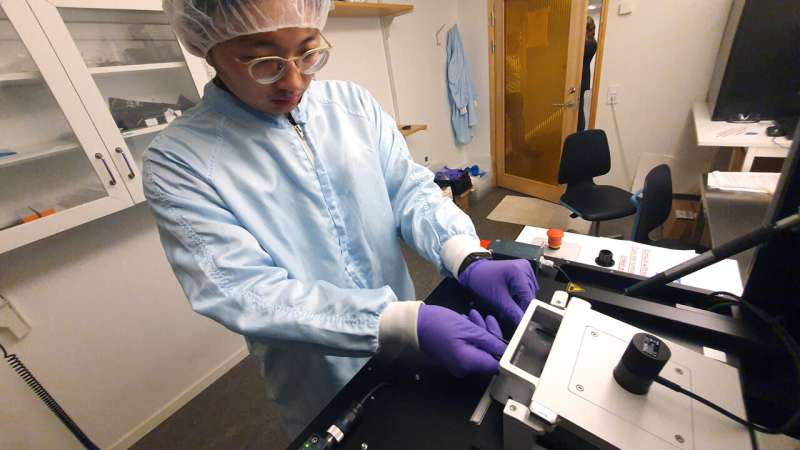Researchers hack a 3D printer to hurry up fabrication of bioelectronics

The velocity of innovation in bioelectronics and demanding sensors will get a brand new increase with the revealing of a easy, time-saving approach for the quick prototyping of units.
A analysis staff at KTH Royal Institute of Expertise and Stockholm College reported a easy technique to fabricate electrochemical transistors utilizing a regular Nanoscribe 3D micro printer. With out cleanroom environments, solvents, or chemical substances, the researchers demonstrated that 3D micro printers could possibly be hacked to laser print and micropattern semiconducting, conducting, and insulating polymers.
Anna Herland, professor in Micro- and Nanosystems at KTH, says the printing of those polymers is a key step in prototyping new sorts of electrochemical transistors for medical implants, wearable electronics and biosensors.
The approach might exchange time-consuming processes that require an costly cleanroom atmosphere. Nor wouldn’t it contain solvents and developer baths which have a unfavourable environmental influence, says the research’s co-author Erica Zeglio, a school researcher with Digital Futures, a analysis middle collectively operated by KTH Royal Institute of Expertise and Stockholm College.
“Present strategies depend on costly and unsustainable cleanroom practices,” Zeglio says. “The tactic we proposed right here would not.”
Polymers are core parts of many bioelectronic and versatile digital units. The functions are various, together with monitoring dwelling tissues and cells and diagnosing illnesses in point-of-care testing.
“Quick prototyping of those units is time-consuming and dear,” Herland says. “It hinders the widespread adoption of bioelectronic applied sciences.”
Utilizing ultrafast laser pulses, the brand new technique creates prospects for the speedy prototyping and scaling of microscale units for bioelectronics, says co-author and KTH Professor Frank Niklaus. The tactic is also used for the patterning of different gentle digital units, he says. The staff utilized the brand new technique to manufacture complementary inverters and enzymatic glucose sensors.
Herland says the tactic might advance analysis in bioelectronic units and considerably shorten the time-to-market.
“This additionally creates the potential of changing among the present parts with cheaper and extra sustainable options,” she says.
The researchers printed their ends in the journal Superior Science.
Extra data:
Alessandro Enrico et al, Cleanroom‐Free Direct Laser Micropatterning of Polymers for Natural Electrochemical Transistors in Logic Circuits and Glucose Biosensors, Superior Science (2024). DOI: 10.1002/advs.202307042
Offered by
KTH Royal Institute of Expertise
Quotation:
Researchers hack a 3D printer to hurry up fabrication of bioelectronics (2024, February 26)
retrieved 27 February 2024
from https://phys.org/information/2024-02-hack-3d-printer-fabrication-bioelectronics.html
This doc is topic to copyright. Other than any truthful dealing for the aim of personal research or analysis, no
half could also be reproduced with out the written permission. The content material is supplied for data functions solely.